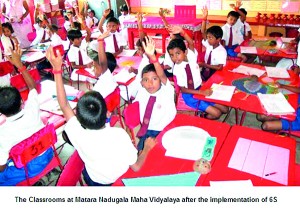Banking
DFCC helps turnaround 100 rural schools across the country
View(s):DFCC has completed the development of 100 needy schools across the country under their corporate social responsibility project banner ‘Towards an Exemplary Society’. The project benefited approximately 50,000 children aged 6 – 10 years especially in rural schools.
DFCC Bank together with its retail banking subsidiary DFCC Vardhana Bank worked in association with the Ministry of Education to bring about discernible change to the lives of these children and their schools through the implementation of the Japanese principles of ‘5 S’ with an added S for safety (6 S) and ‘3R’ (Reduce-Reuse- Recycle) concepts. The project, unique in its approach, achieved the goals through teams of teachers, students and parents working alongside volunteers from DFCC. The Vice President for Group Corporate Communications at DFCC, Rosheeni Wijesekera expressed her views on the project.
What did DFCC Bank want to achieve by implementing this program?
Our objective was to transform the schools in terms of the conditions of school buildings, surrounding gardens, arrangements of the classrooms and overall cleanliness, making the environment conducive to the development and education of children.We also wanted to teach children at an early age to work in a systematic and orgnised manner, and inculcate in them how to value and be advocators of the environment and the need to conserve resources.

Rosheeni Wijesekara, Vice President, Group Corporate Communications
What is the relevance of this project to your core business?
Since DFCC Bank started business in 1956, we have beensupporting entrepreneurs realise their dreams. In the course of our work something we came across was that productivity levels in Sri Lankan enterprises are very low. A key reason is probably the lack of an organized environment, which promotes efficiency. Learning from the Japanese, we decided to introduce the ‘5S’ system to primary school children who will better absorb the principles early in their life and grow to be more organized citizens,forming a more efficient work force.
We also introduced the ‘Reduce, Recycle, Reuse’ concepts to these children, teaching them the values of environmental guardianship and instilling in them respect for the environment in line with our sustainability strategy.
What were the visible improvements that you noticed upon implementation of this project?
There was discernible change in schools in terms of a cleaner, greener and more organized environment. The result was that attendance of children improved, they were happier, more disciplined, organisedand theproductivity levels were positive.
Today, we are proud of the fact that we have given a renewed sense of direction to 100 schools across the country including those in the North and East. In fact, DFCC received recognition for the project with a Distinguished Honoree ‘Stevie Award’ in 2010 at the International Business Awards (IBA) of USA. In the same year the Bank collected the Best CSR Project award in the Education and Training category at the Best Corporate Citizen’s Award 2010 conducted by the Ceylon Chamber of Commerce.
What were the hurdles that you faced in implementing this programme?
Yes we did have to face some obstacles mainly in terms of changing the mindset of Principals, teachers and parents. Lack of resources was also an impediment we had to overcome.
 During the initial stages of the project we came across many people in the schools including parents who didn’t think that this project would be workable and beyond them to achieve. We arranged for many training programmes to educate them on how important it is toimplement this programme and how the results would affect them positively. We were successful in doing so, as the teachers and parents really came together to support us. They even successfully launched innovative fund raising activities to meet the needs of the schools with advice, guidance and help from our branches. DFCC Bank encouraged this activity providing part of the funds through a ‘Matching Grant’ Program. This was another obstacle for us as most of the schools were located in rural areas and improving the conditions in the schools including classrooms, sanitation, drainage, drinking water and other new equipment was an investment that couldn’t be provided by the schools or the parents.
During the initial stages of the project we came across many people in the schools including parents who didn’t think that this project would be workable and beyond them to achieve. We arranged for many training programmes to educate them on how important it is toimplement this programme and how the results would affect them positively. We were successful in doing so, as the teachers and parents really came together to support us. They even successfully launched innovative fund raising activities to meet the needs of the schools with advice, guidance and help from our branches. DFCC Bank encouraged this activity providing part of the funds through a ‘Matching Grant’ Program. This was another obstacle for us as most of the schools were located in rural areas and improving the conditions in the schools including classrooms, sanitation, drainage, drinking water and other new equipment was an investment that couldn’t be provided by the schools or the parents.
How did the staff at DFCC get involved with this project?
CSR is an integral part of our corporate culture. We encourage and reward active involvement of the staff. With regard to this project,  the volunteers from DFCC have put in over 10,000 hours to implement and monitor the program. Schools were assigned to them depending on the location where they engaged themselves as mentors and friends of the staff, students and parents.
the volunteers from DFCC have put in over 10,000 hours to implement and monitor the program. Schools were assigned to them depending on the location where they engaged themselves as mentors and friends of the staff, students and parents.
In addition, employees across the group, especially at branches demonstrated a lot of enthusiasm in raisingfunds forthe schools which also gave them an opportunity to work in teams and build team spirit.
How does the Bank plan to make sure that the efforts taken in this program are sustained over time?
We have put a system in place where selected teachers from the schools were trained in auditing other schools, and even parents have been given the necessary training to independently continue the maintenance of the respective schools.
We have a procedure to recognise schools and teachers who are committed to continuing the practicesand we reward them at an annual event.
Follow @timesonlinelk
comments powered by Disqus


















